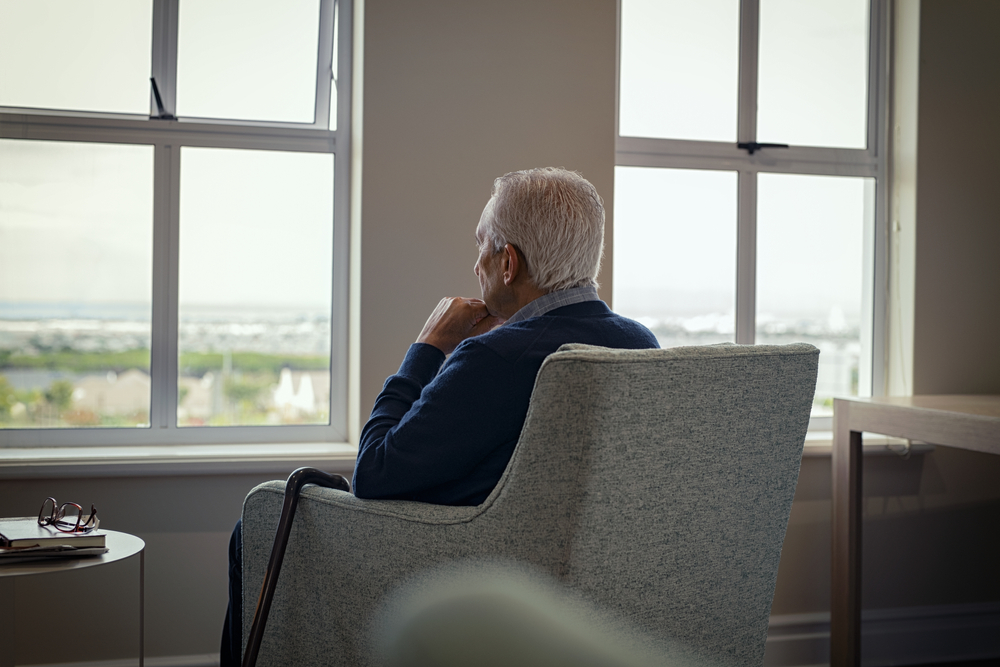Social isolation is a reality for many homebound seniors. But it’s more than just a twinge of loneliness — isolation can lead to serious mental and physical health risks. In this article, we’ll discuss the causes, risks, and signs of social isolation, and how to prevent it.
Common Causes of Social Isolation
As we age, our socialization habits change due to a number of possible circumstances including retirement, friends or family moving away, lack of mobility, or the death of friends or a spouse. As our population of adults having children decreases, there is a rise in the number of seniors without family support and care.
Signs and Symptoms of Social Isolation
Sometimes you can sense a shift in your loved one but are unable to articulate it or recognize the signs that they might need more help. Understanding the signs and symptoms of social isolation is crucial to preventing further decline in their health.
Emotional and behavioral indicators:
- Sadness or depression
- Anxiety
- Mood swings
- Loss of interest in activities
- Withdrawal
Physical and cognitive indicators:
- Neglecting personal hygiene
- Poor nutrition
- Constant fatigue
- Disturbed sleep
- Lack of home maintenance
- Memory issues
- Confusion
How Social Isolation Effects the Mental Health of the Elderly
 Studies show a significant connection between social isolation and cognitive decline, resulting in dementia-related diseases. Research also proves isolation is a cause of premature death, comparable to obesity and smoking.
Studies show a significant connection between social isolation and cognitive decline, resulting in dementia-related diseases. Research also proves isolation is a cause of premature death, comparable to obesity and smoking.
Conversely, social connection is proven to drastically improve mental and physical health, and increase motivation for physical activities and further socialization.
The Link Between Isolation, Depression, and Anxiety
It’s important to understand the link between isolation, depression, and anxiety in order to address this growing concern in older adults and improve the quality of life for our aging population.
A lack of social interactions leaves seniors without a sense of purpose or stimulation. This can lead to feelings of sadness, hopelessness, and worthlessness causing depression.
Anxiety often accompanies both isolation and depression. The uncertainty and fear associated with being alone can lead to heightened anxiety levels in seniors.
The relationship between isolation, depression, and anxiety is cyclical and self-reinforcing. Here’s how:
- Isolation can directly cause feelings of depression and anxiety.
- Seniors experiencing depression and anxiety may withdraw even more, avoiding social interactions and becoming more isolated.
- This withdrawal further deepens their sense of isolation, worsening their mental health, and creating a vicious cycle that is difficult to break.
How Social Isolation Effects The Physical Health of the Elderly
Social isolation can have a profound effect on one’s physical health. Understanding these effects is essential for developing support for our aging population.
Long-term illness
Loneliness can lead to increased long-term illnesses like high blood pressure, contributing to heart disease and stroke. Other illnesses include arthritis, lung disease, and impaired mobility.
Unhealthy behaviors
Lack of social interaction can lead to poor lifestyle choices, increasing obesity, smoking, and other related health problems.
Diabetes
Isolation can lead individuals to poorly manage their medical needs, resulting in diabetes or other health risks.
Increased mortality risk
Studies show the combined effects of physical and mental health decline contribute to a shortened lifespan.
Social Isolation Prevention Strategies
Preventing social isolation in homebound seniors requires a proactive and multifaceted approach. Here are some effective strategies:
Early Detection and Intervention
Identifying signs of isolation early can prevent its negative impacts. Regular check-ins by healthcare providers, family, and friends help spot changes in behavior or mood, allowing for timely intervention.
Engaging Homebound Seniors in Activities
Keeping seniors engaged in enjoyable activities like gardening, puzzles, and arts and crafts provides mental stimulation and a sense of purpose.
The Role of Family and Community in Prevention
Family and community play vital roles in preventing isolation. Regular visits, phone calls, and invitations to family events keep seniors connected. Neighbors and local volunteers can provide additional support through regular check-ins.
Ways to Reduce Social Isolation
1. Technology
Tablets or smartphones with video chat and telehealth services encourage seniors to stay connected with loved ones and healthcare providers.
2. Community and Social Programs
Local programs designed for seniors, e.g. community centers offer activities and social gatherings
3. Local Support Groups
Support groups connect seniors and allow them to share experiences and form friendships.
4. Neighbors
Foster relationships with neighbors who can provide companionship and support.
5. Pets
Pets offer companionship, reduce loneliness, and encourage physical activity.
6. Group Exercise Programs
Join group exercise classes tailored for seniors to promote physical health and social interaction.
7. Counseling
Get access to mental health counseling to address feelings of isolation and depression.
8. Create a Daily Social Routine
Establish a routine that includes social interactions, whether through phone calls, video chats, or in-person visits.
The Role of Home Health Care
Home health care plays a pivotal role in preventing social isolation among homebound seniors. Home health care providers can develop personalized care plans that specifically address social isolation, incorporating activities and strategies to keep seniors engaged. Regular visits from caregivers provide crucial social interaction and emotional support, reducing feelings of loneliness.
Americare’s Virtual Senior Center: A Gateway to Connection
The VSC (Virtual Senior Center) is an Americare initiative to combat social isolation in older adults via technology. Our goal is to help seniors engage and interact with the world from the comfort of their homes.
The VSC provides 400+ live classes and entertainment led by experts and allows for a two-way video chat so seniors can interact directly with program members and instructors.
Programs include:
- Art, Culture, and Language
- Exercise
- History, News, and Travel
- Music & Games
- Science & Nature
- Wellness & Livelihood support
- Technology & Training
- Pets Together Virtual Visits
Americare Can Help
Americare assists seniors in New York every day from the comfort of their homes, providing them with the companionship and care they need to live their best lives and combat social isolation. We provide home health care including NHTD and CDPAP programs, allowing seniors to choose who gets to care for them and help them receive services at home, rather than within a nursing home.
Reach out to us to learn more about our programs and the Virtual Senior Center, and let’s ensure no senior ever feels alone.

